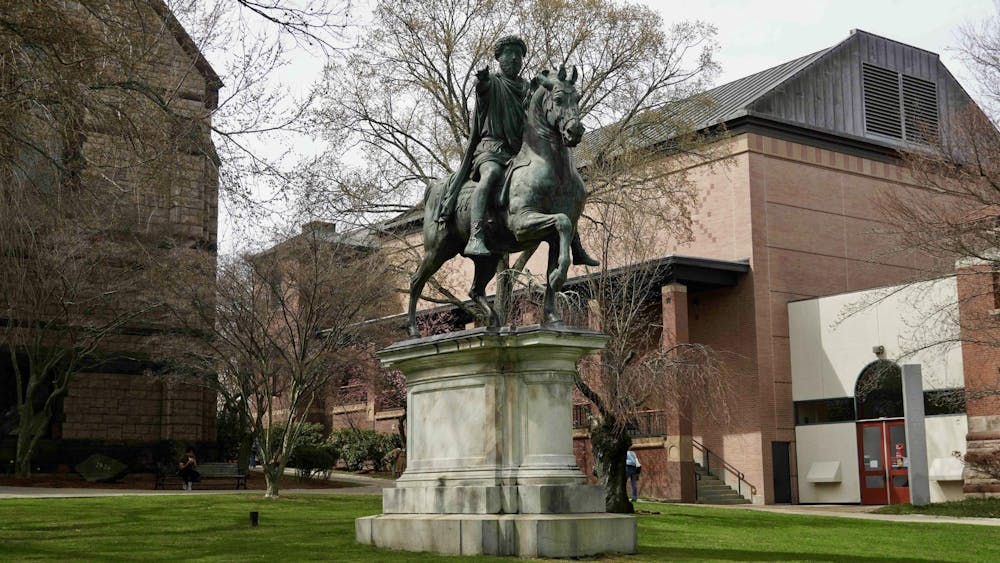Follow The Herald’s latest coverage on how the Trump administration is impacting Brown here.
At least nine grants awarded to Brown researchers, totaling over $8 million, have been terminated since Trump took office, freezing studies in their tracks and leaving some participants without treatment. Affected researchers told The Herald they had to lay off some staff from their studies, marking the first reports of layoffs from projects due to recent federal funding cuts.
These grants, the most recent of which was terminated Monday, funded research related to a variety of issues, ranging from youth HIV prevention to COVID-19 testing for incarcerated people. Across these awards, over $3.5 million in funding had yet to be disbursed.
It is unclear if the National Institutes of Health grant terminations of the last 40 days since the first grant was cut are related to the Trump administration’s planned freeze of $510 million in Brown’s federal funds. The Wall Street Journal and Science reported that the funding freeze would target grants from the NIH.
When asked about whether these nine grants were part of the larger freeze, a spokesperson from the U.S. Department of Health and Human Services told The Herald that the agency “is partnering with other federal agencies to conduct a comprehensive review of grants awarded to universities that have failed to protect students from discriminatory behavior.”
As of March 31, around one percent of existing research grants at Brown had been cut, Provost Francis Doyle and Executive Vice President for Planning and Policy Russell Carey ’91 wrote in a community-wide letter.
They wrote that grants targeted “seems to include considerations of gender, race or diversity, equity and inclusion,” adding that the funding came from agencies including the NIH, NASA and the State Department.
Three years ago, Ethan Moitra, an associate professor of psychiatry and human behavior at the Warren Alpert Medical School, was awarded over $2.3 million from the NIH to study the mental health of LGBTQ+ individuals following the COVID-19 pandemic. The study, which began in September 2022, enrolled 240 participants and was set to end in late August.
But on Feb. 28, Moitra received an email that the grant had been terminated, as it “no longer effectuates agency priorities” because it studies “transgender issues.”
These terminations come after an executive order from the White House that recognizes “two sexes, male and female,” and defines sex as “an individual’s immutable biological classification as either male or female.”
According to Moitra, the University plans to appeal the termination.
Multiple lawsuits have been filed against HHS to block grant terminations, including by the Rhode Island Attorney General, The Herald previously reported.
Federal officials have touted billions of dollars saved by grant cuts. But research funds are provided and spent incrementally. Terminating grants while research is ongoing makes the funds spent on incomplete research a “sunk cost” since the findings never see the light of day, Moitra and other researchers noted.
Chair of Epidemiology at Brown’s School of Public Health Katie Biello, who studies HIV prevention, has experienced NIH funding cuts first-hand. Biello wrote in an email to The Herald she had spent all but $90,000 of her $632,000 award, but after her grant was cut, the research remains incomplete.
“The time and money commitment (over $550,000) was effectively wasted,” she wrote.
Moitra was in the final stretch of studying how short-term counseling could be a “starting point” for decreasing anxiety and depression in LGBTQ+ individuals after the COVID-19 pandemic.
LGBTQ+ people “are just disproportionately impacted by a lot of different health outcomes like mental health,” said Moitra’s co-principal investigator Philip Chan, a physician and associate professor of medicine and behavioral and social sciences.
The project recruited 240 LGBTQ+ identifying community members with symptoms of anxiety and depression to be part of the study, with half receiving “treatment as usual” and the other half receiving two sessions of counseling intervention focused on enhancing mindfulness, acceptance and social connection. Participants were contacted periodically for follow-up check-ins after the intervention.
When Moitra received the letter informing him that his grant had been terminated, about 180 of the 240 study participants had already completed all of their data collection, but about 60 members were still active in the study. Now, the entire study has been put on pause.
As of April 4, Moitra has not yet informed study participants of the project’s pause. He explained that he fears that these funding cuts send a broader harmful message to LGBTQ+ individuals in the country.
“The (Trump) administration is essentially trying to erase a population,” Chan said. “That’s obviously very, very, very concerning.”
The White House did not immediately respond to The Herald’s request for comment.
The funding cuts have impacted research staff, as well. Chan noted that he has “had to give notice to a couple people” they would be laid off, adding that “if we receive more grant cuts, then we’ll have to be giving more people notice.”
Biello also said that she also had to let go of some of her research staff, and is currently working with Human Resources to “help find them new positions within the School (of Public Health) when possible.”
“Having to tell them that we can no longer support them has been heartbreaking,” she wrote.
This was not the only one of Chan’s studies that was cut.
Chan worked alongside Professor of Medicine and Behavioral and Social Sciences Amy Nunn as co-PIs on a NIH-funded study that researched pre-exposure prophylaxis, a medication that is highly effective in reducing HIV transmission. On March 20, the researchers were notified via email that the funding for this project was terminated.
The email said the research was based on “amorphous equity objectives” that are “antithetical to the scientific inquiry.” It further stated that such studies “are often used to support unlawful discrimination on the basis of race and other protected characteristics.” Nunn and Chan’s study primarily focused on Black and Hispanic men who have sex with men.
Nunn noted that Black and Hispanic men who have sex with men have a nearly 50% and 20% chance of contracting HIV during their lifetimes, respectively. For white men who have sex with men, this statistic decreases to around 0.7%, making it important to study these communities, Nunn said.
“This is not just the DEI word salad,” she said. “This is bringing services to people who need them the most.”
The study had been undergoing clinical trials in Mississippi, Rhode Island and Washington, D.C., with around 25 participants enrolled, Nunn said. The care of patients has since been “abruptly terminated,” she added.
Biello had been preparing to pilot a study that aimed to improve adherence to an HIV medication regimen through group-based intervention efforts. The study, based in Brazil, planned to enroll 72 adolescents who identify as a gay or bisexual man or transgender woman.
But, on March 21, the funding for this project was slashed, effectively pausing all activity.
Another one of Biello’s studies was part of the Adolescent Medicine Trials Network, the only multi-center research network that studies adolescents and young adults. The “entire network was terminated” following funding cuts, Biello wrote in an email to The Herald.
None of the study’s participants will continue to receive care from the network. Prior to the cancellation, participant enrollment had been underway for six months.
When she received notice of the terminations, she wrote, “my first reaction was to sob.”
“To read the words that my research is ‘antithetical to the scientific inquiry, do nothing to expand our knowledge of living systems, provide low returns on investment and ultimately do not enhance health, lengthen life or reduce illness’ — that was cutting,” she wrote, referencing the notification email.
All four affected researchers said these cuts will run deeper than just their individual studies.
“Squashing studies, especially ones that were so far along like mine, undermines our ability to share scientific insights,” Moitra said. It “undermines, ultimately, our scientific innovations.”
For Biello, the potential $510 million funding freeze would add to the “detrimental” effects on research at Brown, but believes that researchers can “withstand these baseless attacks.”
Looking forward, Chan emphasized that he felt the “overall University leadership is doing the best they can.” He added that he believes the University should “consider some ways to support and maintain LGBTQ research.”
“NIH funding really shouldn’t be seen (as) an expense—it’s an investment,” Biello wrote. “It is an economic investment and it’s a health investment.”

Elise Haulund is a science & research editor and sophomore from Redondo Beach, CA. Concentrating in English and biology, she has a passion for exploring the intersection between STEM and the humanities. Outside of writing, researching and editing, she enjoys ballet-dancing, cafe-hopping and bullet-journaling.

Claire Song is a university news and science & research editor for The Herald. She is a sophomore from California studying Applied Math-Biology. She likes to drink boba in her free time.





